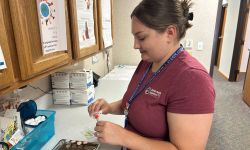Michigan residents worry about going hungry as COVID layoffs surge, poll finds

LANSING — More than 1 in 4 Michigan residents worry about being able to put food on their table, and more than half of all laid-off or furloughed workers are unsure how they’ll feed their families, according to a new statewide poll conducted amid the coronavirus pandemic.
“Those are staggering numbers, and I think it tells us we’re going to have to deal with this problem well past COVID,” said pollster Richard Czuba, whose Glengariff Inc. firm conducted the survey of 600 Michigan residents for the Detroit Regional Chamber. “This is not a partisan issue right now, this is all across the state, people are dealing with this.”
The poll, released Monday and conducted Wednesday evening and Thursday following Capitol protests over Gov. Gretchen Whitmer’s stay-home order, points to both public health concerns and the ongoing debate over how and when to reopen the state economy.
- The latest: Michigan coronavirus map, locations, updated COVID-19 news
- What Michigan's new coronavirus stay-at-home executive order means
- When Michigan unemployment, stimulus checks, and $600 CARES money will arrive
More than 1 million state workers, about a quarter of the workforce have filed for unemployment. Of those laid off or furloughed, 69 percent surveyed expect a “major” or “catastrophic” impact on their personal finances, according to the poll.
The results show Michigan job losses have moved “beyond record breaking, into the realm of breath taking,” said Sandy Baruah, president and CEO of the Detroit Regional Chamber. Economists believe the state’s unemployment rate will top the 16.4 percent Michigan hit in 1982 and the 14.4 percent peak in 2009 during the Great Recession.
Whitmer, a Democrat, is expected on Monday to begin detailing plans of how to ease her stay-home order by May 1, while the Republican-led Legislature urges a new approach as the coronavirus curve appears to bend.
Michigan House Republicans released their own recommendations for Whitmer on Monday morning, proposing what they called a “risk-based, regional approach” that would relax travel rules across the state but maintain stricter standards in counties with higher case numbers like Wayne, Oakland and Macomb.
Even in those “highest risk” counties, House Republicans want Whitmer to remove restrictions on large retailers that she ordered to close their paint, flooring and outdoors sections. And Republicans want the governor to adopt new federal guidance that could allow for more construction crews and landscapers to return to work.
“Under the state’s current response, even residents who work alone in areas of the state with very low occurrences of COVID-19 are precluded from earning a paycheck or participating in perfectly safe outdoor activities, causing everything from confusion and frustration to unnecessary job loss and hardship,” House Speaker Lee Chatfield, R-Levering, said in a statement.
Whitmer has hinted that she’s open to a regional approach for reopening Michigan businesses, but she and health care experts have also repeatedly noted that the coronavirus does not respect state, county or other geographic boundaries.
As Bridge Magazine reported Saturday, new caseloads are declining in metro Detroit while other parts of the state are beginning to hit their peak, according to an analysis of county-level data.
Chatifeld and other legislators who developed the House GOP recommendations “consulted with experts from a wide variety of backgrounds, including health care, labor, small business owners, industry experts, and local government officials,” said spokesperson Gideon D’Assandro.
The House Republican plan envisions a three-phase process for “returning to a new normal,” but legislative leaders did not set a clear timeline for how long that might take.
Under a separate Senate GOP plan, sports arenas and concert venues that attract large crowds could not open to the public until there is no active spread of the coronavirus for 30 days or until a vaccine has been available for 30 days, which may not happen any time soon.
The Detroit chamber is advocating for “smart” back-to-work policies, Baruah said.
The group represents companies eager to resume operations, but also regional health care providers who have toiled under a surge of hospitalizations and deaths, Baruah said. And at this point, concerns over hospital capacity are less about bed space than they are staffing, he said.
“Their human capital now has been running max out for six or seven weeks,” Baruah said of medical workers, noting overtime hours and burnout rates. “We have to make sure whatever we do, our health care system is going to be able to manage.”
Roughly 36 percent of Michigan residents think it will take a year or more for Michigan to return to normal, according to the Glengariff Inc. poll, which was conducted via automated calls and text messages because the firm could not bring live operators in to work.
Another 39 percent predicted Michigan would be back to normal in one to six months, while 18 percent said they think that could happen within one month.
There are glimmers of hope in the data, however.
- 46 percent of residents surveyed said they think their finances could return to normal within one month, for instance, but 39 percent said they think it will take either months or a full year.
- Among those furloughed or laid off, 35 percent polled said their financial recovery will take a couple of months, while 21 percent said it would take at least a year.
Despite the economic turmoil and last week’s public protest, Michigan residents appear relatively happy with Whitmer’s job performance.
Roughly 57 percent of Michigan residents approve of how she’s handling the pandemic, while 37 percent disapprove, according to the poll.
By contrast, 44 percent of residents surveyed say they approve of how President Donald Trump has handled the COVID-19 crisis, compared to 50 percent who disapprove.
The poll has a margin of error of plus or minus 4 percentage points. Of those surveyed, 39 percent identified themselves as Democrats, 35 percent as Republicans and 26 percent as political independents.
RESOURCES:
- Hey, Michigan, here’s how to make a face mask to fight coronavirus
- Michigan coronavirus dashboard: cases, deaths and maps
- Michigan families can get food, cash, internet during coronavirus crisis
- How to give blood in Michigan during the coronavirus crisis
- 10 ways you can help Michigan hospital workers right now
- Michigan coronavirus Q&A: Reader questions answered
- How to apply for Michigan unemployment benefits amid coronavirus crisis
See what new members are saying about why they donated to Bridge Michigan:
- “In order for this information to be accurate and unbiased it must be underwritten by its readers, not by special interests.” - Larry S.
- “Not many other media sources report on the topics Bridge does.” - Susan B.
- “Your journalism is outstanding and rare these days.” - Mark S.
If you want to ensure the future of nonpartisan, nonprofit Michigan journalism, please become a member today. You, too, will be asked why you donated and maybe we'll feature your quote next time!








